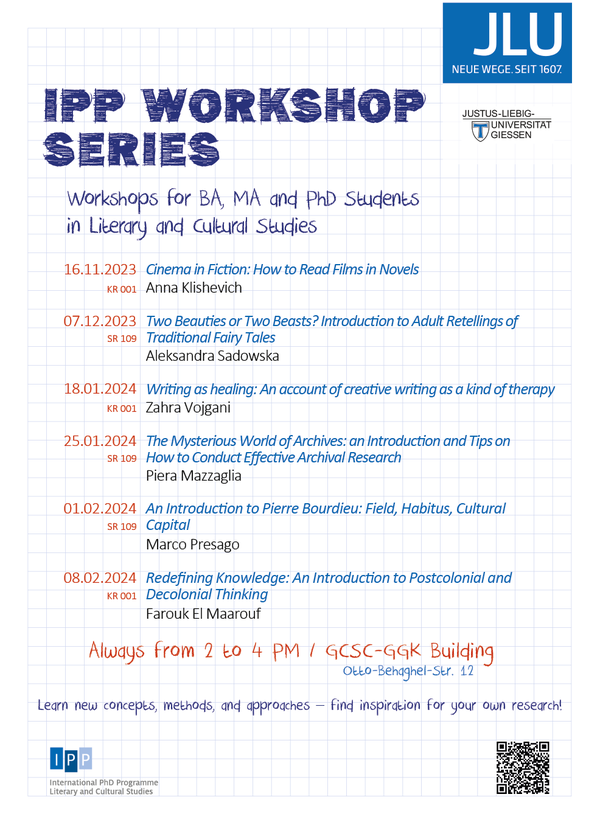Writing as healing: An account of creative writing as a kind of therapy
- https://www.uni-giessen.de/en/faculties/ggkgcsc/events/semesteroverview/previous/archive/wise2324/ipp-ws-series/writing-as-healing
- Writing as healing: An account of creative writing as a kind of therapy
- 2024-01-18T14:00:00+01:00
- 2024-01-18T16:00:00+01:00
Narrating an unpleasant experience from the past or an ongoing fear "frees up" cognitive resources. To define expressive writing as writing that allows us to make sense of our thoughts and feelings, I contend that we restore some degree of agency when we write to transmit and create meaning. Telling a story lets the author switch from being a powerless victim to a narrator who can observe and retell his life events. The therapeutic potential of writing from a literary perspective necessitates a thorough analysis of the topics in a story. There have been some literary studies to support a conclusion on the advantages of writing about unpleasant emotions, for example when looking at memory studies, such as "Healing and Post-traumatic Growth" by LaLonde in "Trauma and Literature", edited by Roger Kurtz, and resilience studies, as well as studies on memoirs, although further research is required.
The purpose of this workshop is to analyse writings that describe previous personal traumatic experiences and demonstrate the resiliency the narrator displays by telling her narrative afterward. I'll focus on the stories of immigrants who underwent trauma upon leaving their country and emphasize immigration as an unpleasant process in terms of cultural background. Perhaps the cultural background causes specific cultural shocks when relocating to another location, or perhaps certain people are more or less accepting of certain cultural backgrounds than others, making immigration worse or better. Participants will be given examples from the novel "Désoriental" 2016 by Negar Djavadi, with the workshop's main topic being "Why is writing about unpleasant situations able to cure its narrator?" The students are first given ten minutes to reply to the writing prompts I provide. After that, I'd recommend concentrating on literary analysis of the extracts, and anyone who wants to add their own style is welcome to do so on a voluntary basis. In the end, I ask them how they felt about the incident and the written words they used to describe it so that we may collectively explore the process of recalling their unpleasant memories.
Keywords: Expressive Writing, Heal up, Trauma, Negative Experience
// Zahra Vojgani

